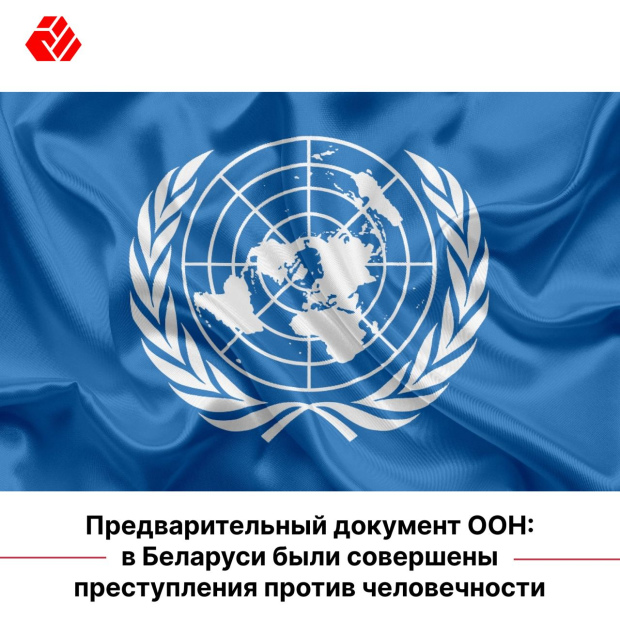On March 15, the UN Human Rights Council published an unofficial version of the report on human rights in Belarus. In an 18-page report posted online, the Office of the United Nations High Commissioner for Human Rights (OHCHR) concludes that a crime against humanity has been committed in Belarus. The report talks about sexualized and other torture. On March 20, at the 55th session of the UN Council, the report will be read out.
OHCHR estimates that since 1 May 2020, more than 5,500 people, including at least 55 children, have been criminally convicted on politically motivated charges.
When preparing the report, 657 Belarusians were interviewed. 29% reported torture, 61% - ill-treatment. Some have suffered life-changing injuries such as hearing loss, broken spine, broken arms, legs, nose, nerve damage, etc.
Consequences: chronic diseases, depression and panic attacks, post-traumatic disorder. Most of the victims are men, including one person with a disability.
Those arrested were subjected to violence, in many cases amounting to torture, in 38 cases in 2022 and 9 cases in 2023.
There is reason to believe that Belarusian security forces have committed rape and other forms of sexual violence, including sexualized torture and forced nudity.
From the section “Conclusions under applicable international law”:
“Assessing the totality of the evidence collected over the 3 years of this mandate, OHCHR has reasonable grounds to conclude that the Government has carried out an organized, sustained and systematic campaign of violence, repression and punishment in accordance with, or in furtherance of, a policy of attack against civilian populations as specifically described and designated as real or perceived opposition, with the purpose of silencing, suppressing, obstructing and containing such opposition or further manifestations thereof, both in public and private. Under international criminal law, persecution is defined as the intentional and serious deprivation of fundamental rights, contrary to international law, on the basis of membership in a particular group or entity. Taking into account (i) the range of human rights violations described in this report, committed against actual or perceived political opponents in a discriminatory manner, (ii) their nature and severity as regards the rights to life, physical integrity and security and freedom from arbitrary detention, as well as with regard to the exercise of other fundamental freedoms, and (iii) the nature of their systematic commission through the legal and institutional apparatus of the State, with encouragement at the highest level, OHCHR has reasonable grounds to believe that a crime against humanity has been committed in the form of persecution along with other related acts that can be established as a consequence of the described human rights violations.”
From the section “Holding you accountable”:
“Allegations of torture and other ill-treatment were ignored, including by judges, even when presented with compelling evidence.”
“OHCHR continued to collect and preserve information and evidence related to individuals allegedly involved in the above-mentioned gross human rights violations and possible crimes under international law. This includes senior political and command positions and other officials who have implemented a legal regime directed against real or perceived political opponents. The extent of individual criminal responsibility deserves further investigation and determination by the competent judicial authorities using international standards. ”
Why is it important? If the crimes of the Lukashenko regime are recognized as crimes against humanity (deprivation of liberty, torture, murder, rape and other forms of sexual violence, enforced disappearances, persecution and deportation), then they will be considered international crimes. The UN report could be the basis for the UN Security Council to file a criminal case against Lukashenko at the Hague Court (International Criminal Court).
It is worth noting that OHCHR included recommendations in the report: to the government of Belarus - to release the children, prevent stateless persons, etc.; UN member states - to prosecute in national courts, promote international protection of refugees, provide additional protection measures for persons who have been forced to leave the country, including assistance in issuing travel documents.
OHCHR estimates that since 1 May 2020, more than 5,500 people, including at least 55 children, have been criminally convicted on politically motivated charges.
When preparing the report, 657 Belarusians were interviewed. 29% reported torture, 61% - ill-treatment. Some have suffered life-changing injuries such as hearing loss, broken spine, broken arms, legs, nose, nerve damage, etc.
Consequences: chronic diseases, depression and panic attacks, post-traumatic disorder. Most of the victims are men, including one person with a disability.
Those arrested were subjected to violence, in many cases amounting to torture, in 38 cases in 2022 and 9 cases in 2023.
There is reason to believe that Belarusian security forces have committed rape and other forms of sexual violence, including sexualized torture and forced nudity.
From the section “Conclusions under applicable international law”:
“Assessing the totality of the evidence collected over the 3 years of this mandate, OHCHR has reasonable grounds to conclude that the Government has carried out an organized, sustained and systematic campaign of violence, repression and punishment in accordance with, or in furtherance of, a policy of attack against civilian populations as specifically described and designated as real or perceived opposition, with the purpose of silencing, suppressing, obstructing and containing such opposition or further manifestations thereof, both in public and private. Under international criminal law, persecution is defined as the intentional and serious deprivation of fundamental rights, contrary to international law, on the basis of membership in a particular group or entity. Taking into account (i) the range of human rights violations described in this report, committed against actual or perceived political opponents in a discriminatory manner, (ii) their nature and severity as regards the rights to life, physical integrity and security and freedom from arbitrary detention, as well as with regard to the exercise of other fundamental freedoms, and (iii) the nature of their systematic commission through the legal and institutional apparatus of the State, with encouragement at the highest level, OHCHR has reasonable grounds to believe that a crime against humanity has been committed in the form of persecution along with other related acts that can be established as a consequence of the described human rights violations.”
From the section “Holding you accountable”:
“Allegations of torture and other ill-treatment were ignored, including by judges, even when presented with compelling evidence.”
“OHCHR continued to collect and preserve information and evidence related to individuals allegedly involved in the above-mentioned gross human rights violations and possible crimes under international law. This includes senior political and command positions and other officials who have implemented a legal regime directed against real or perceived political opponents. The extent of individual criminal responsibility deserves further investigation and determination by the competent judicial authorities using international standards. ”
Why is it important? If the crimes of the Lukashenko regime are recognized as crimes against humanity (deprivation of liberty, torture, murder, rape and other forms of sexual violence, enforced disappearances, persecution and deportation), then they will be considered international crimes. The UN report could be the basis for the UN Security Council to file a criminal case against Lukashenko at the Hague Court (International Criminal Court).
It is worth noting that OHCHR included recommendations in the report: to the government of Belarus - to release the children, prevent stateless persons, etc.; UN member states - to prosecute in national courts, promote international protection of refugees, provide additional protection measures for persons who have been forced to leave the country, including assistance in issuing travel documents.


 Continue
Continue
